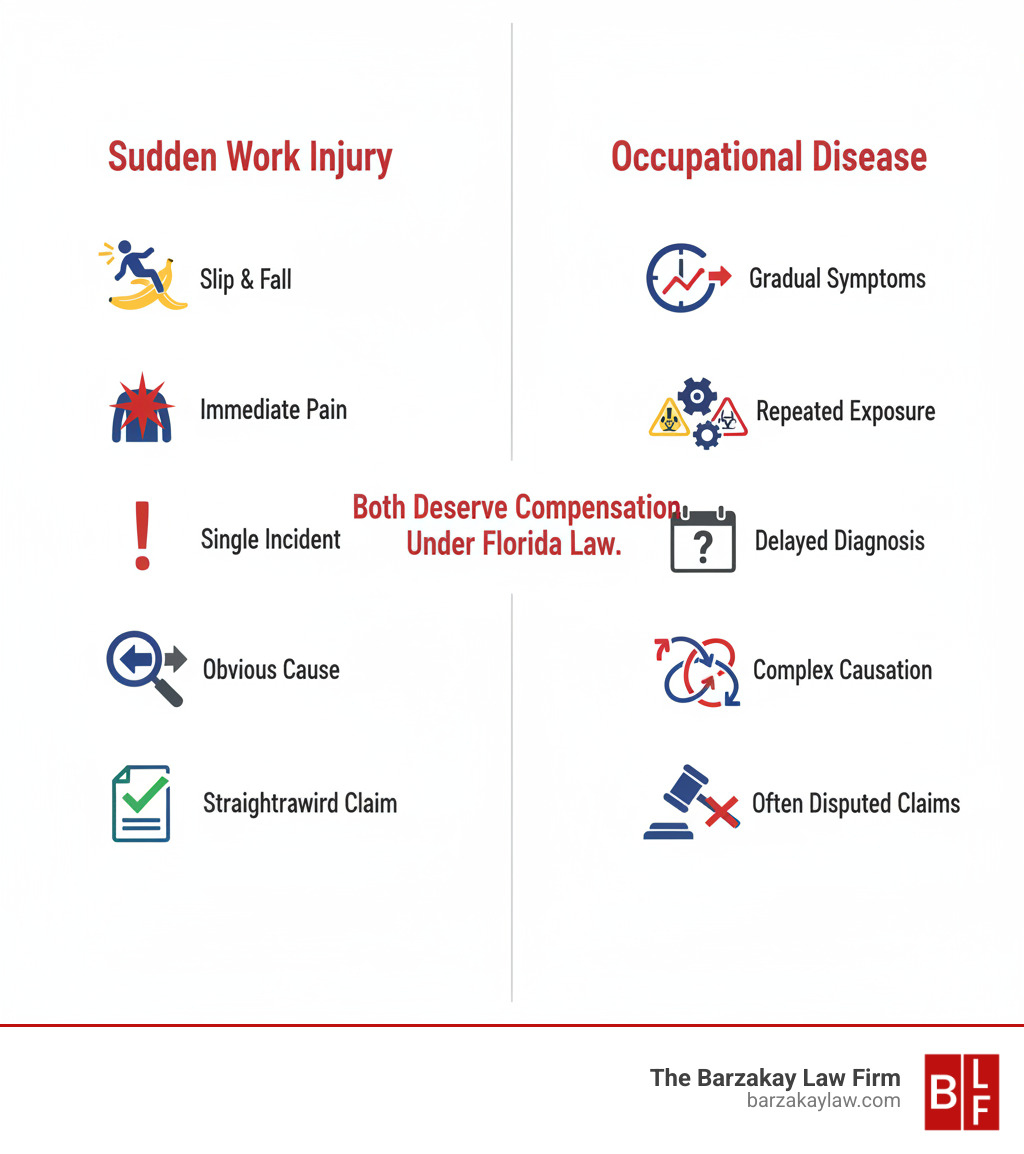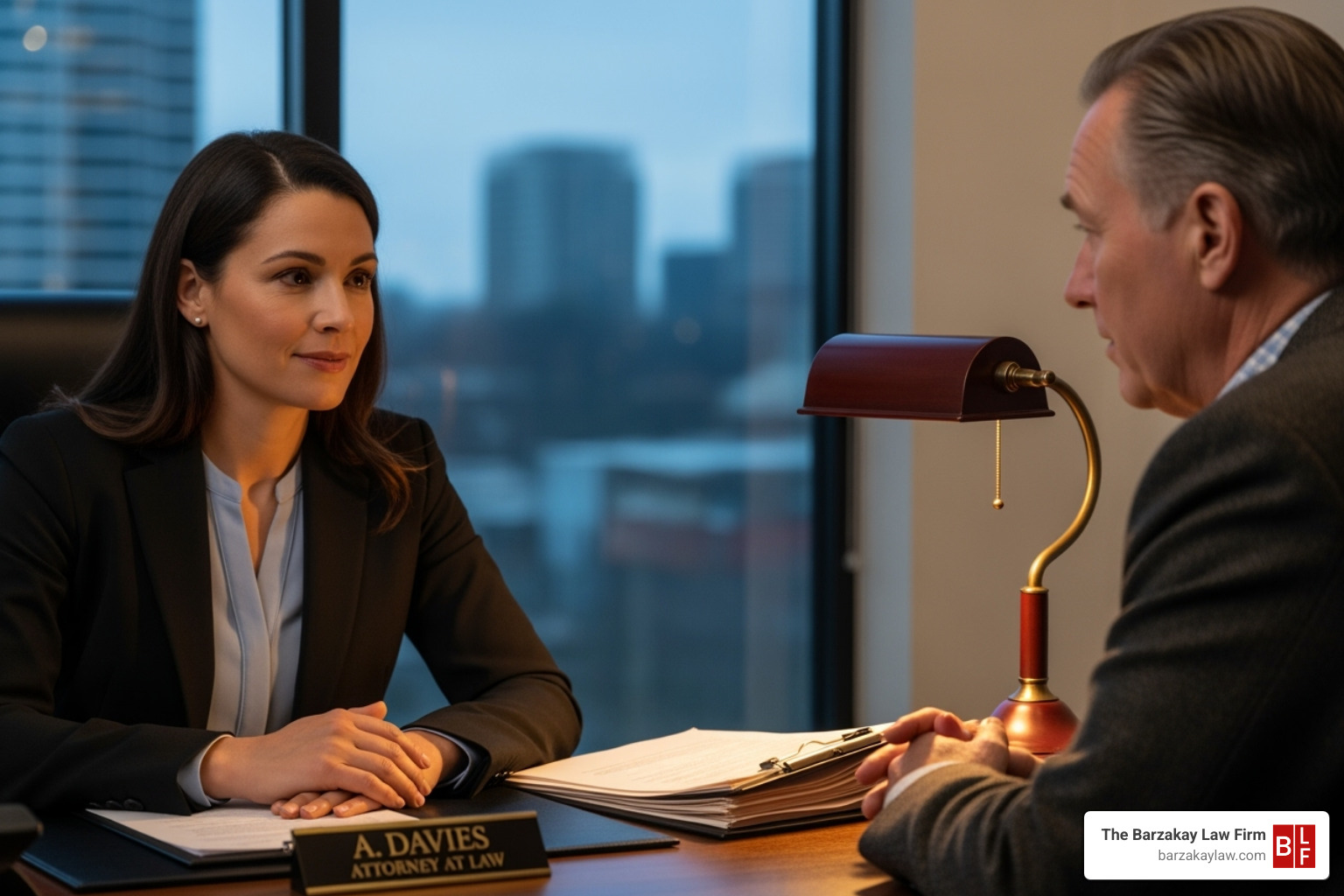When Your Job Makes You Sick
An occupational disease lawyer helps workers who get sick from their jobs. These attorneys handle the complex medical and legal proof needed to show your illness is work-related, manage strict deadlines, appeal denied claims, and fight for benefits like medical care and lost wages.
Key ways an occupational disease lawyer can help you:
- Prove causation using medical evidence and testimony from qualified professionals.
- Steer Florida’s workers’ compensation system and its strict filing deadlines.
- Appeal denied claims through mediation or hearings.
- Maximize your benefits, including medical costs, lost wages, and disability compensation.
- Explore third-party claims against negligent manufacturers or other parties.
Unlike a sudden accident, occupational diseases develop slowly from exposure to hazards. You might not realize your chronic illness is work-related until a doctor makes the connection. For workers in South Florida—from construction sites in Hollywood to healthcare facilities in Miami—this can mean facing large medical bills and lost income.
Proving these claims is harder than a typical on the job injury attorney case because you must prove your job caused the illness. Insurance companies often dispute this link. An occupational disease lawyer knows how to build a strong case using the right medical evidence to meet Florida’s legal standards.
Identifying an Occupational Disease: More Than a Workplace Injury
Workplace health problems don’t always happen in a dramatic moment. Some develop quietly over months or years. These are occupational diseases, and they deserve the same legal protection as a sudden injury. Proving them, however, requires more documentation and often the guidance of an occupational disease lawyer.
What Is an Occupational Disease?
An occupational disease is a medical condition caused by your work environment or job duties. Its key feature is gradual onset due to prolonged exposure to harmful conditions. For example, a worker who develops chronic back problems after years of improper lifting has an occupational disease. To get compensation, you must prove a causal link between the work and the illness, showing your job was the major contributing cause.
Common Causes and Examples
- Chemical exposure: Handling solvents, pesticides, or industrial cleaners can lead to respiratory problems, skin disorders, or cancer. Asbestos exposure can cause mesothelioma or lung cancer decades later.
- Repetitive motion: Tasks like typing or assembly line work can cause carpal tunnel syndrome and damage nerves, tendons, and joints.
- Hearing loss: Prolonged exposure to loud noise on construction sites or in manufacturing plants can cause permanent hearing damage.
- Respiratory diseases: Breathing in silica dust can cause silicosis, while other dusts and fumes can lead to occupational asthma or COPD.
- Skin disorders: Contact dermatitis is common among healthcare workers, hairdressers, and industrial workers who handle irritants.
The Centers for Disease Control and Prevention offers more information on various workplace health hazards.
Industries at Risk in Hollywood and Miami
- Construction workers in Miami and Hollywood face risks from asbestos, silica dust, and loud noise, leading to lung disease, hearing loss, and musculoskeletal problems.
- Healthcare workers in Boca Raton and across South Florida are exposed to infectious diseases, chemicals, and physical strain from lifting patients.
- Manufacturing workers often deal with industrial chemicals, metal dust, and loud machinery, leading to respiratory conditions and repetitive strain injuries.
- Office workers can develop carpal tunnel syndrome, neck strain, and chronic back pain from poor ergonomics.
- Service industry workers in South Florida’s tourism economy perform repetitive tasks that can cause chronic back, shoulder, and skin conditions.
Navigating Florida’s Workers’ Compensation System for Your Illness
When your job harms your health, you deserve compensation, but the process can be difficult. Florida’s workers’ compensation system is designed to help, but proving an occupational disease claim requires navigating complex legal standards and gathering specific medical evidence.
Eligibility for an Occupational Disease Claim
Florida’s workers’ compensation is a no-fault system, meaning you don’t have to prove your employer was negligent. However, you must establish that your work was the major contributing cause of your illness. This means your job must be the primary factor, not just a minor one. The legal test also requires showing that your job put you at a significantly increased risk compared to the general public. An occupational disease lawyer can help build the case to meet these strict standards.
The Critical Role of Medical Evidence
Your medical records are the foundation of your claim. You need a clear diagnosis and a statement from your treating physician, to a reasonable degree of medical certainty, that your job caused or significantly worsened your condition. This involves compiling all diagnostic tests, treatment records, and physician notes. In complex cases, we may work with medical professionals to provide opinions connecting your work environment to your disease. The insurance company will likely request an Independent Medical Examination (IME) with a doctor of their choosing. We can help you prepare for this and protect your rights during the process.
How Pre-Existing Conditions Affect Your Claim
A pre-existing condition does not automatically disqualify you from receiving benefits. If your job aggravated or accelerated a health problem, making it substantially worse, you may still have a valid claim. The key is proving that your work was the major contributing cause of the worsening condition. This requires medical evidence showing a clear deterioration beyond what would have happened naturally. It is essential to be honest about your medical history, as this allows us to build a stronger case and anticipate the insurance company’s arguments.
The Step-by-Step Process of Filing Your Claim
Filing an occupational disease claim can feel daunting, but understanding the process makes it manageable. Here’s a breakdown of what you need to do to protect your rights.
Notifying Your Employer and Seeking Treatment
As soon as you suspect your illness is work-related, you must act. Florida law gives you 30 days from the date you realize the connection to inform your employer. We recommend notifying them in writing (email or letter) to create a clear record. Once notified, your employer should authorize medical treatment through their workers’ compensation insurance. Seeing authorized doctors is crucial to ensure your bills are covered. Throughout this process, document everything: communications, medical reports, and bills.
Meeting Florida’s Strict Filing Deadlines
After notifying your employer, you must still file a formal claim. In Florida, you generally have two years to file a Petition for Benefits. This deadline runs from the “date of findy”—the date you knew or should have known your illness was work-related and serious enough to need medical care or cause you to miss work. This date can be disputed by insurance companies, who may argue you should have known earlier. Contacting a work injury compensation lawyer promptly is vital to ensure you don’t miss this critical deadline.
Gathering Evidence to Prove Your Case
Proving an occupational disease claim requires building a solid case that links your illness to your job. Key evidence includes:
- Medical documentation: Records showing your diagnosis, treatment, and your doctor’s opinion on the cause of your condition.
- Employment history: Job descriptions and records showing the duration of your exposure to workplace hazards.
- Workplace exposure records: Safety Data Sheets for chemicals, air quality reports, or noise level measurements.
- Witness statements: Testimony from coworkers who can confirm the hazardous conditions you faced.
In some cases, opinions from industrial hygienists or other professionals may be needed to analyze workplace conditions and strengthen your claim. Our goal is to create an undeniable picture showing that your job made you sick.
How an Occupational Disease Lawyer Can Strengthen Your Case
When you’re dealing with a serious illness, the last thing you need is a fight with an insurance company. Having an occupational disease lawyer on your side can make all the difference.
Building a Case the Insurance Company Can’t Ignore
Insurance companies often look for reasons to deny occupational disease claims. They might argue your illness is due to aging or factors outside of work. We know their tactics and how to counter them.
Our job is to build a case so strong that the insurer must take it seriously. We handle the work of gathering your medical records, documenting your employment history, and collecting evidence of workplace exposures. We work with your doctors to get clear medical opinions connecting your condition to your job. Armed with this evidence, we negotiate from a position of strength to secure a fair settlement that covers your medical care, lost wages, and future needs.
What to Do If Your Claim Is Denied
A denial is not the final word. It’s common for insurers to deny these claims initially, hoping you’ll give up. If your claim is denied, we can file a Petition for Benefits to formally challenge the decision. The case may then proceed to mediation, where a neutral party helps both sides seek an agreement. If mediation fails, we are prepared to argue your case before a Judge of Compensation Claims. We will present evidence, call witnesses, and fight for the outcome you deserve, appealing an unfavorable decision if necessary.
Exploring All Avenues for Recovery
Workers’ compensation is not always the only source of recovery. If a third party—someone other than your employer—contributed to your illness, you may have a separate liability claim. These third-party claims allow you to recover damages not covered by workers’ comp, such as pain and suffering.
For example, the manufacturer of a toxic chemical or the general contractor on a construction site in Miami could be held liable. We investigate every case to identify all parties who may be responsible for your illness and pursue these claims alongside your workers’ compensation case to maximize your total recovery.
Understanding the Compensation and Long-Term Support Available
When an occupational disease disrupts your life, Florida’s workers’ compensation system is there to provide a safety net. Understanding the available benefits can help you see the path forward.
Types of Benefits You Can Receive
If your claim is approved, you may be entitled to several types of benefits:
- Medical Benefits: Covers all reasonable and necessary medical treatment for your work-related illness, including doctor’s visits, medication, and therapy.
- Wage Replacement Benefits: Replaces a portion of your lost income if you are unable to work. This includes Temporary Total Disability (TTD) if you can’t work at all, or Temporary Partial Disability (TPD) if you can only do light-duty work for less pay.
- Permanent Impairment Benefits: If your illness causes a permanent impairment, you may receive benefits based on the severity of your condition. This includes Permanent Total Disability (PTD) if you can never return to work.
- Vocational Rehabilitation: Provides job retraining and placement services if you cannot return to your old line of work.
- Death Benefits: If an occupational disease is fatal, surviving family members can receive financial support and help with funeral expenses.
A workers comp law firm can help ensure you receive every benefit you are entitled to.
The Long-Term Impacts of an Occupational Disease
Many occupational diseases are chronic conditions with lifelong consequences. The financial strain can be immense, with ongoing medical costs and a permanently reduced earning capacity. Physical limitations can change your daily life, affecting your ability to enjoy hobbies or even perform simple tasks. The emotional toll, including anxiety, frustration, and depression, is also significant. An occupational disease lawyer understands these long-term realities and fights for compensation that addresses not just your immediate needs but also your future security.
Frequently Asked Questions About Occupational Disease Claims
When you’re dealing with a work-related illness, you’re bound to have questions. Here are answers to some of the most common concerns we hear from workers in South Florida.
What are the most common occupational diseases reported in Florida?
We see certain conditions frequently in our region, from Hollywood to Miami.
- Carpal tunnel syndrome is common among office and assembly line workers due to repetitive hand motions.
- Hearing loss affects many in construction and manufacturing from prolonged exposure to loud machinery.
- Respiratory conditions like asthma and bronchitis are linked to workplace dust, fumes, and chemicals.
- Asbestos-related diseases such as asbestosis and mesothelioma still arise, often from work in older buildings.
- Skin disorders like contact dermatitis are frequent among healthcare workers and others who handle chemicals.
- Cancers linked to workplace carcinogens are also reported, though they may take years to develop.
The National Safety Council’s statistics on preventable injuries provide more context on workplace safety.
How long do I have to file an occupational disease claim in Florida?
This is a critical deadline. In Florida, you generally have two years to file a workers’ compensation claim. The clock starts on the “date of findy”—the day you knew or reasonably should have known that your illness was work-related and serious enough to require medical care. Because this date can be disputed, it is crucial to act quickly. Waiting too long can result in losing your right to benefits entirely. We’ve seen too many workers miss this deadline, so please seek legal guidance as soon as you suspect a problem.
Can I receive a lump-sum settlement for my occupational disease claim?
Yes, a lump-sum settlement, known as a “Clincher Agreement,” is possible. This provides a single payment to close your case permanently. While this can be appealing, it’s a serious decision. When you accept a lump-sum settlement, you give up your right to all future benefits, including medical treatment and wage replacement. Insurance companies often favor these settlements to limit their future costs. Before you agree to any offer, you need to consider if the amount will truly cover your lifetime medical needs and lost earning capacity. We can help you evaluate whether a settlement is fair or if keeping your benefits open is the better choice.
Take the Next Step to Protect Your Rights and Health
Living with an occupational disease is draining. The complexity of filing a claim, with its strict deadlines and skeptical insurance companies, only adds to the stress. But you do not have to face this challenge alone.
At The Barzakay Law Firm, we stand beside injured workers throughout South Florida, including Hollywood, Miami, Boca Raton, and Fort Lauderdale. We understand how these illnesses develop and how to fight back when insurance companies deny the connection between your job and your condition.
We work on a contingency fee basis, meaning you pay us nothing unless we win your case and secure compensation for you. This allows you to focus on your health while we handle the legal fight.
Our approach is to gather the evidence, meet every deadline, and pursue all avenues for recovery. Your occupational disease is about more than just bills; it’s about your future and your right to a safe workplace.
If you suspect your illness is work-related, time is critical due to Florida’s two-year statute of limitations. The sooner we start, the stronger your case will be.
Learn more about your options with a workers’ compensation lawyer or contact us today for a free, no-obligation consultation. Let’s discuss your situation and fight for the compensation you deserve.




